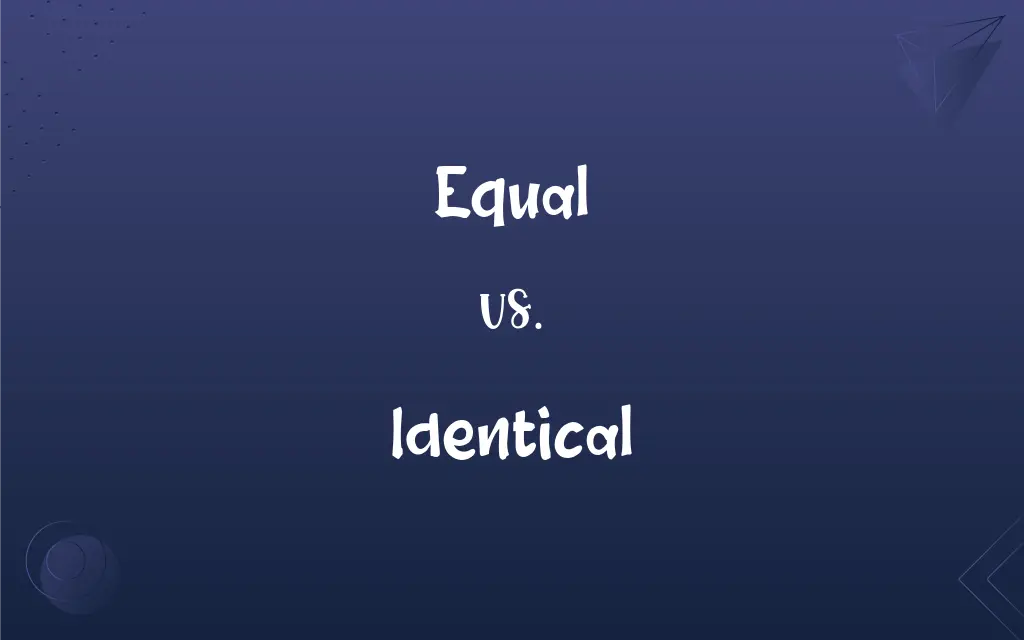Equal vs. Identical: What's the Difference?
Edited by Aimie Carlson || By Janet White || Published on January 12, 2024
"Equal" means being the same in quantity, size, degree, or value, while "identical" means exactly the same, without any difference.

Key Differences
"Equal" implies a similarity in terms of value, amount, or quantity. It suggests a comparison where two or more items have the same measure or value. "Identical," however, refers to two or more items being exactly the same in every aspect.
In mathematics, "equal" is used to denote equivalence in value, such as 2 + 2 equals 4. "Identical" in a mathematical sense would mean two expressions are exactly the same in form and value, like two copies of the same equation.
"Equal" is often used in a broader context, like in discussions of rights where individuals are said to be equal, implying they have the same rights and status. "Identical" is used when two objects share the same characteristics in every detail, like identical twins.
"Equal" can also imply fairness and balance in treatment or distribution, such as equal opportunities for all. "Identical" is more about absolute sameness, like two products coming off the same manufacturing line.
In a legal context, "equal" might refer to equal treatment under the law, whereas "identical" would mean two legal documents are exactly the same, word for word.
ADVERTISEMENT
Comparison Chart
Meaning
Same in value, size, degree, or quantity
Exactly the same in every detail
Contextual Use
Broader contexts like rights, opportunities
Specific contexts like appearance, composition
Mathematical Usage
Denoting equivalence in value
Indicating exact sameness in form and value
Implication in Differences
May have differences in other aspects
No differences in any aspect
Legal Usage
Equality in treatment or rights
Exact sameness in documents or clauses
ADVERTISEMENT
Equal and Identical Definitions
Equal
Having the same value.
The two sides of the equation are equal.
Identical
Exactly the same in every detail.
The two paintings were identical.
Equal
Fair and balanced.
All team members should have equal responsibilities.
Identical
Being the very same one.
She bought two identical dresses.
Equal
Showing no variation in condition or character.
The competitors were equal in skill.
Identical
Duplication without any difference.
The copies were identical to the original.
Equal
The same in status or rights.
Every citizen is equal under the law.
Identical
Similar in every aspect.
The twins have identical features.
Equal
Equivalent in quantity or measure.
Divide the cake into equal parts.
Identical
Perfectly alike, without any disparity.
Their responses were identical.
Equal
Having the same quantity, measure, or value as another.
Identical
Being the same
Another orator who used the senator's identical words.
Equal
(Mathematics) Being the same or identical to in value.
FAQs
Is "identical" used in mathematics?
Yes, to indicate exact sameness in equations or values.
Are "equal" and "identical" interchangeable?
Not always, as "identical" suggests a higher degree of sameness.
How is "identical" different from "equal"?
"Identical" means being exactly the same in every detail.
Can objects be identical but not equal?
Rarely, as "identical" usually encompasses being "equal."
How is "equal" used in social contexts?
To suggest fairness and balance in rights and opportunities.
Can "equal" be used in a legal context?
Yes, it's often used to denote equality under the law.
Does "equal" always mean identical?
No, "equal" can mean same in value but not necessarily identical.
Does "equal" suggest mathematical equivalence?
Yes, in equations or when comparing quantities.
What does "equal" signify in general terms?
It signifies sameness in value, rights, or quantity.
Is "equal" used in discussions of gender equality?
Yes, frequently in the context of equal rights.
Is "identical" used in fashion?
Yes, for clothes or accessories that are exactly the same.
Can "equal" be used in sports?
Yes, for teams or scores that are evenly matched.
Is "identical" a common term in genetics?
Yes, especially when referring to identical twins.
Can "identical" refer to identical twins?
Yes, it's commonly used in this context.
Is "identical" relevant in manufacturing?
Yes, for products that are made to be exactly the same.
Is "equal" a concept in economics?
Yes, often in the context of equal distribution of resources.
Can "equal" imply different forms but same value?
Yes, like different shapes having equal area.
How is "equal" used in the context of relationships?
To imply fairness and balance in treatment and responsibilities.
Does "identical" mean the same as "replica"?
Yes, in the sense of being an exact copy.
Can "identical" apply to feelings or opinions?
Yes, when they are exactly the same.
About Author
Written by
Janet WhiteJanet White has been an esteemed writer and blogger for Difference Wiki. Holding a Master's degree in Science and Medical Journalism from the prestigious Boston University, she has consistently demonstrated her expertise and passion for her field. When she's not immersed in her work, Janet relishes her time exercising, delving into a good book, and cherishing moments with friends and family.
Edited by
Aimie CarlsonAimie Carlson, holding a master's degree in English literature, is a fervent English language enthusiast. She lends her writing talents to Difference Wiki, a prominent website that specializes in comparisons, offering readers insightful analyses that both captivate and inform.






































































